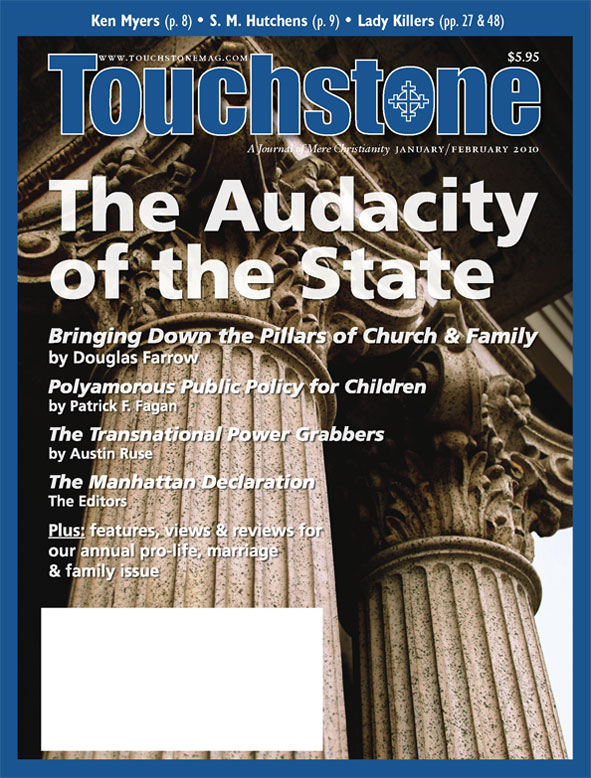Wisdom from the Table
Patrick Henry Reardon on the Foundational Culture of the Dining Room
Perhaps I am mistaken, but I suspect one of the problems involved in the pursuit of wisdom is that some folks fancy they are further along than they really are. I am thinking of those who read the Upanishads and Plato when they have yet to master Mother Goose.
Normally, the simpler things come first: Grammar before logic. We crawl, then walk. We take the pen in hand after we are competent with the pencil, and maybe the pencil should wait until we are sufficiently skilled with the crayon.
And we don’t begin alone. The aforementioned implements of learning, in fact—all of them normally employed in private—depend on our competence with the one human implement we learn to use in a social setting. I mean that most basic utensil: the spoon.
Let me state my thesis outright: The quest of wisdom commences with learning how to eat. The most basic steps towards virtue are mastered at the family table. Character begins with etiquette. Teach a child how to dine like a human being, and you have gone wonderfully far in his education.
A Social Enterprise
If I had not known this fact before, I would have learned it from Sirach (especially 31:12—32:13). This aspect of Sirach’s theory flows from his conviction that the quest of wisdom is necessarily a social enterprise. This is a proposition on which he insists repeatedly: The wise man is one who knows how to live wisely in society and devotes his life to its greater good. And where does a wise man acquire the rudiments of this calling? At the family table, when he first learns to eat with his family.
It is at home ( domus) that human beings are—literally—“domesticated.” It is during meals that they increase, not only “in stature,” but also “in wisdom” (Luke 2:52). Here they acquire those patterns of affability, restraint, courtesy, social dependence, and cultivated joy that prepare them for a wise life in a larger world.
In acquiring table discipline—which pertains to language and posture as well as eating—young human beings are instructed in the simple pleasures of what is called “conviviality.” This sweet expression literally means “living in common.”
Indeed, I submit that the lessons learned at the family table are more fundamental to the pursuit of wisdom than those learned in the classroom. It is at meals that souls and minds are nourished, as well as bodies. It is largely from eating with the family that helpful information is conveyed and the foundational lines of character are formed.
Four Lessons
In this setting, one gradually learns the art of the “inner check,” as Irving Babbitt calls it. Restraint is in order. There are things that may not be done at table—and certain subjects never spoken of—and other things that must be said or done at table. Without this inner impulse of discipline, there is no chance of conviviality. The eater “conforms” to a standard, adopting as his own a “form” common to those who share the blessings of the meal.
First, a person learns to pray at table, to thank God for his blessings, some of which the family shares at mealtime. He thus acquires the habit of gratitude, which is essential to a soul pleasing to God. A man that does not pray at meals is no better than a dog. (This is said with proper apologies to the family pet.)
Second, because he has just thanked God for his food, a person cannot logically complain of it. This would contradict his prayer of thanksgiving. On the contrary, he eats gratefully what is put in front of him, and a child is correctly given no choice in this matter. He thus learns to receive what life offers and does not entertain the fancy that experience must conform to his preferences. This simple lesson is indispensable to the formation of character.
Third, a person learns elementary self-control. He is discouraged from gorging himself like a mule. He gets a feel for proper portions in eating, because there are others there at the table with whom he must share the food. Thinking of the others at the table, he also acquires the habit of restricting his passions and appetites, a lesson fundamental to the moral formation of character.
Fourth, at the family table a person becomes versed in the formalities of speech common in a polite society. Under the gentle discipline of his elders, he acquires the ability to communicate with others kindly, a trait also vital to the contouring of character.
A Convivial Person
Mastered at the family table, these simple disciplines are essential to the social growth of the human being. He will learn to think of himself as—and feel himself to be—an integral member of the larger social reality, gradually gaining an awareness of his place and duties in that society. Becoming what Henri Bergson calls un moi social, he will learn that strong and pleasant conviviality essential to a wise life.
Patrick Henry Reardon is pastor emeritus of All Saints Antiochian Orthodox Church in Chicago, Illinois, and the author of numerous books, including, most recently, Out of Step with God: Orthodox Christian Reflections on the Book of Numbers (Ancient Faith Publishing, 2019).
subscription options
Order
Print/Online Subscription

Get six issues (one year) of Touchstone PLUS full online access including pdf downloads for only $39.95. That's only $3.34 per month!
Order
Online Only
Subscription

Get a one-year full-access subscription to the Touchstone online archives for only $19.95. That's only $1.66 per month!
bulk subscriptions
Order Touchstone subscriptions in bulk and save $10 per sub! Each subscription includes 6 issues of Touchstone plus full online access to touchstonemag.com—including archives, videos, and pdf downloads of recent issues for only $29.95 each! Great for churches or study groups.
Transactions will be processed on a secure server.
more on culture from the online archives
more from the online archives
calling all readers
Please Donate
"There are magazines worth reading but few worth saving . . . Touchstone is just such a magazine."
—Alice von Hildebrand
"Here we do not concede one square millimeter of territory to falsehood, folly, contemporary sentimentality, or fashion. We speak the truth, and let God be our judge. . . . Touchstone is the one committedly Christian conservative journal."
—Anthony Esolen, Touchstone senior editor












